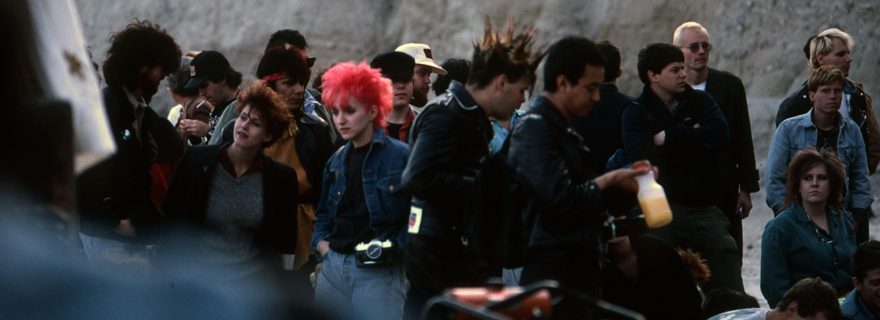Desolation Center
Movie Rating:
3
As riveting as the recent Fyre Fest documentaries have been, Desolation Center shows us that there’s some heart and soul in the history of music festivals.
With its roots in the early 1980s Los Angeles punk scene, Desolation Center tells the story of the short-lived DIY punk concert series of the same name. Following a clear timeline from its inception to its legacy, the documentary is standard storytelling enhanced by an impressive story and equally impressive archival footage.
When the Los Angeles Police Department started targeting punk shows, the bands and concert promoters decided to take their gigs out of the clubs and into the desert. Desolation Center offers up little context for this discussion within the greater political situation in L.A., and never strays beyond the narrow scope of these punk bands, but its laser focus makes for a swift and concentrated film.
The Desolation Center first focused on non-club locations for these gigs, but soon expanded to the middle of the desert. All the sand and wind was less than ideal for the amplifiers and microphones, but the punk spirit fit right in with the far-flung location and scrappy attitude.
If the documentary is true to life, the number of shows arranged by the Desolation Center were very few, but the amount of footage from those shows is astounding. Early footage of Black Flag, Sonic Youth, The Meat Puppets, and the Minutemen carry much of the film, woven in with talking-head segments of people who were really there. The punks may have been scrappy, but they were excellent at preserving their legacy by documenting their exploits.
Desolation Center suffers from the typical documentary ill of believing its subject is profound and the participants were aware of the weight of their actions at the time. In certain interviews, the speakers go on about the fact that they were going places no one had ever been, and doing things that had not been done before. While this might be true in this case, watching people talk about how awesome they were is a little tedious. The film does its best to alleviate this problem by including certain interviews of people who thought their actions were downright reckless, and other people who can pinpoint the legacy of these gigs. The truth is that modern music festivals might not have existed as we know them without the Desolation Center shows, but this is by no means the only kernel of inception of music festivals in general. That would be aggressively ignoring the music festivals of the 1960s, including Monterey Pop and Woodstock. Maybe you’ve heard of those, though Desolation Center never mentions either.
The common thread throughout Desolation Center is a love for music and doing things outside the confines of mundane culture. These people look back at what they accomplished, and what their legacy became, with such affection and pride that it’s hard not to feel their love for the era. This wasn’t about money or about fame; it was about community and the music. We could all use a reminder that events for the sake of art, with that level of purity, existed and thrived not that long ago.





